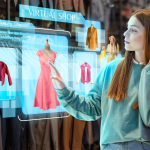Personalized Shopping: The Rise of AI and Customization in Retail

Introduction
Personalized shopping has become a game-changer in the retail industry, offering customers unique, tailored experiences that cater to their individual needs and preferences. Powered by artificial intelligence (AI), personalization in retail has evolved from basic recommendations to a sophisticated, data-driven experience that anticipates customer desires. This article delves into how AI is reshaping the shopping journey, enabling retailers to create customized experiences that drive customer satisfaction and loyalty.
1. AI-Driven Recommendations
AI has revolutionized how retailers recommend products to shoppers. By analyzing data such as purchase history, browsing behavior, and demographic information, AI algorithms can predict products a customer might be interested in. This enables retailers to present relevant items in real time, whether through personalized emails, homepages, or targeted ads. For example, Amazon’s “Customers who bought this also bought” feature is driven by AI, creating a dynamic shopping experience based on the customer’s previous interactions with the platform.
2. Dynamic Pricing and Offers
One of the most significant innovations in personalized shopping is dynamic pricing. AI allows retailers to adjust prices based on a variety of factors, including customer behavior, demand, location, and competitor pricing. Personalized discounts or promotional offers can be tailored to individual shoppers, rewarding them with exclusive deals based on their purchasing patterns or loyalty status. This not only enhances customer satisfaction but also encourages repeat purchases and brand loyalty.
3. Virtual Assistants and Chatbots
Virtual assistants and chatbots powered by AI are making personalized shopping easier and more efficient. These tools engage with customers in real time, answering questions, assisting with product selection, and guiding shoppers through the purchasing process. For instance, many brands use AI-powered chatbots to suggest products, provide personalized size recommendations, or offer support for troubleshooting issues with orders. The convenience of 24/7 assistance has made shopping smoother and more interactive.
4. Personalized Recommendations Across Channels
Omnichannel retailing, where customers can shop across multiple platforms seamlessly, is greatly enhanced by AI. Personalized experiences are now consistent across various touchpoints, whether in-store, online, or through a mobile app. Retailers collect data from each channel to create a unified view of the customer, ensuring that they receive tailored recommendations regardless of where they shop. For example, a shopper who browses a pair of shoes on a retailer’s website might receive an offer or reminder about the same product if they visit the store or check their mobile app.
5. AI-Powered Inventory Management
Personalization doesn’t just affect the customer experience; it also transforms inventory management. AI algorithms predict consumer demand for specific products, helping retailers optimize their stock and reduce overstocking or stockouts. This allows for the delivery of products that are most likely to appeal to customers in specific regions or during certain times of the year, ensuring that what customers want is readily available. Through AI, retailers can also create hyper-targeted assortments of products in specific stores or regions based on local customer preferences.
6. Personalized Shopping Experiences In-Store
While e-commerce has been the focal point of personalized shopping, physical stores are also embracing AI-driven customization. Smart mirrors, augmented reality (AR), and in-store apps now enable shoppers to receive personalized product recommendations and try on items virtually. For example, clothing retailers like Zara and Nike are using AI and AR to offer virtual try-on experiences, where customers can see how clothes or shoes might look on them without physically trying them on. This seamless integration of digital and physical retail experiences enhances customer engagement and boosts sales.
7. Predictive Analytics and Shopping Behavior
AI-powered predictive analytics help retailers forecast consumer behavior, allowing them to anticipate trends and stock products accordingly. By analyzing data points such as past purchases, browsing history, and social media activity, AI can predict what products are likely to appeal to a particular customer. This enables retailers to offer timely promotions or send reminders for products customers may be interested in. These insights not only help personalize the shopping experience but also improve inventory and sales strategies.
8. Customizable Products
Customization is a major trend in retail, particularly in industries like fashion, footwear, and beauty. AI allows customers to design or personalize products according to their preferences. For instance, platforms like Nike and Adidas let customers customize shoes with unique colors and features, while beauty brands like Fenty Beauty offer personalized makeup shades based on a customer’s skin tone. AI-driven tools analyze customer preferences and measurements to ensure that the customization process results in products that fit perfectly with individual tastes.
9. Enhanced Customer Loyalty Programs
AI plays a vital role in enhancing loyalty programs by offering customers personalized rewards based on their purchasing history and engagement. Instead of offering the same rewards to all customers, AI analyzes buying habits and tailors promotions that feel more relevant to each shopper. For instance, a customer who frequently buys skincare products may receive personalized discounts or exclusive offers for related items like facial serums or lotions, increasing the likelihood of repeat purchases.
10. Ethical Shopping and Personalization
As consumers become more conscious about sustainability and ethics, AI is also helping them make more ethical shopping choices. Many retail platforms now offer personalized recommendations for sustainable or eco-friendly products, helping customers make purchases that align with their values. Retailers can provide transparency on the sourcing and environmental impact of their products, giving customers a more informed and ethical shopping experience.
Conclusion
The rise of AI and customization in retail has transformed the shopping experience, making it more personalized, efficient, and responsive to individual needs. From dynamic pricing and personalized recommendations to virtual assistants and customizable products, AI is reshaping how consumers shop and how retailers engage with their customers. As AI continues to evolve, we can expect even more innovative, tailored shopping experiences that anticipate customer needs and preferences, ultimately driving loyalty and satisfaction in the retail space.










